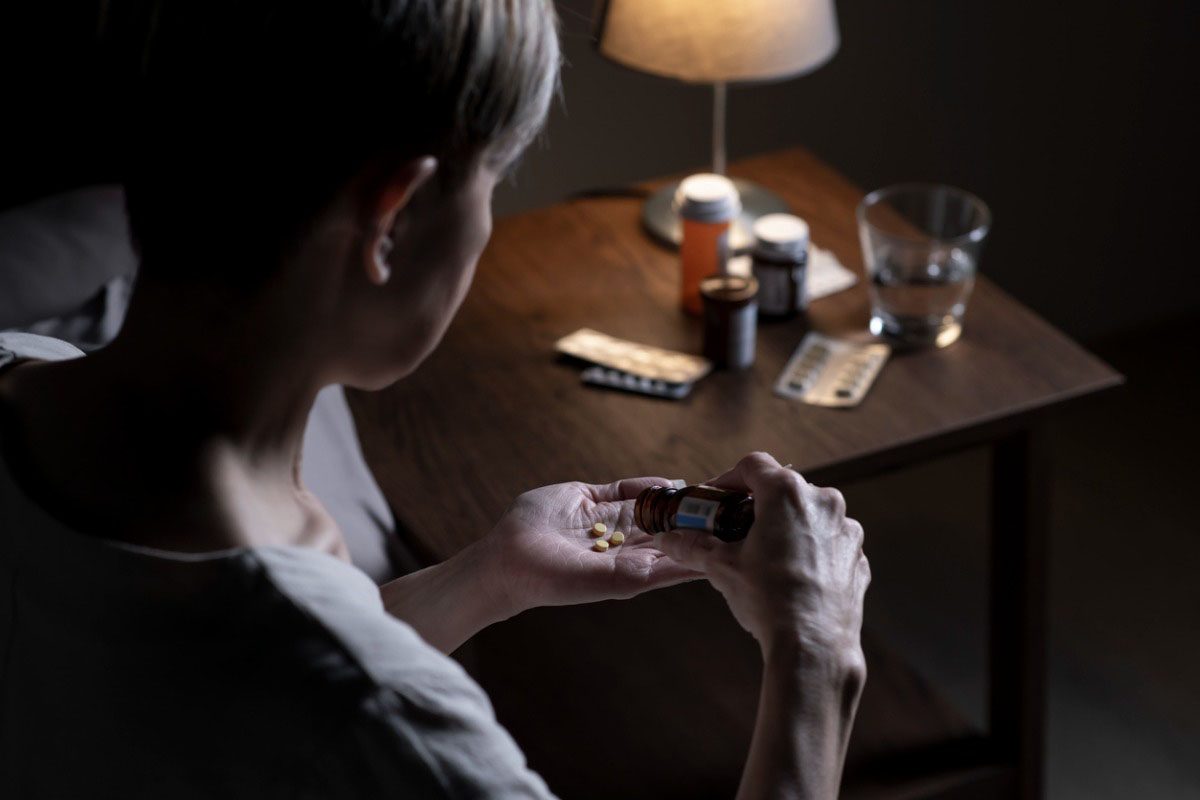
J Clin Psychiatry 2022;83(4):21br14314
To cite: Zimmerman M, Becker L. Psychiatric patients who do not believe they deserve to get better. J Clin Psychiatry. 2022;83(4):21br14314.
To share: https://doi.org/10.4088/JCP.21br14314
© 2022 Physicians Postgraduate Press, Inc.
aDepartment of Psychiatry and Human Behavior, Brown Medical School, and Department of Psychiatry, Rhode Island Hospital, Providence, Rhode Island
*Corresponding author: Mark Zimmerman, MD, 146 West River St, Providence, RI 02904 ([email protected]).
Seven years ago, our clinical research group began to work in our hospital’s partial hospital program. Patients are most commonly referred to the partial hospital because they are in crisis, are being transferred from a more intensive level of care (ie, inpatient services), or are referred from outpatient settings because they have not responded to treatment. While the average length of stay in the partial hospital program is approximately 2 weeks, a minority of patients are treated for more than a month. During the course of prolonged admissions, some patients make little change in their behavior and do not experience much improvement in symptoms or functioning despite intensive psychotherapy and ongoing pharmacotherapy. In trying to understand the reasons for the lack of progress, we learned that some patients asserted that they did not believe that they deserved to feel better. It has been our clinical impression that the patients who did not believe that they deserved to feel better were less responsive to treatment.
We are unaware of any studies of psychiatric patients’ beliefs as to whether they merited feeling better. This is understandable because it is reasonable to assume that patients seeking treatment in an ambulatory setting are doing so because they wish to get better. While desired clinical improvement is usually the primary reason that patients seek treatment, patients also come for treatment for extrinsic rather than intrinsic considerations. The encouragement (or requirement) of family, friends, school officials, employers, or the legal system are some external factors that may be responsible for patients coming for treatment. Incentive to be discharged sooner from inpatient settings and the desire not to be hospitalized when seen in the emergency department are some other motivations for patients to present for care in ambulatory settings. Such dynamics likely influence patients’ opinions of whether they want or need treatment. However, our focus in this brief report is not on whether patients want treatment, or want to get better, but instead on patients’ internalized belief of whether they deserve to feel better.
We examined the prevalence of the belief of undeservingness and the demographic and clinical features that characterized patients who held this belief. In working with patients in the partial hospital, it was our clinical impression that patients with depression, a history of trauma, and borderline personality disorder were more likely to question whether they deserved to feel better. We also hypothesized that patients who did not believe that they deserved to feel better would more frequently drop out of treatment and, if they stayed in treatment, would have a greater length of stay in treatment.
Method
Four hundred five patients admitted to the Rhode Island Hospital partial hospital program were interviewed with semistructured diagnostic interviews and completed a self-administered clinical history questionnaire that included a question about whether the patient thought he/she/they deserved to feel better (“Do you deserve to feel better? 1 = yes, absolutely; 2 = I think so; 3 = I am not sure; 4 = probably not; 5 = definitely not”). The diagnostic interview and questionnaire were completed before treatment began.
Admissions to the program are on a rolling basis, with patients completing varying lengths of treatment. Treatment noncompleters included patients who either voluntarily discontinued treatment (eg, reported dissatisfaction with the program, discharged due to nonattendance) or were discharged due to external limitations (eg, insurance no longer covering partial hospitalization level of care, need to return to work, transfer to inpatient). The other patients were treatment completers.
Results
The majority of the patients indicated that they deserved to get better (83.0%, n = 336). Fifty-two patients (12.8%) indicated that they were not sure whether they deserved to feel better, and 17 (4.2%) indicated that they did not believe that they deserved to feel better. The patients who were unsure that they deserved to feel better and those who indicated that they did not deserve to feel better were combined and compared to the patients who indicated that they deserved to feel better.
The patients who did not indicate that they deserved to feel better were significantly younger (mean ± SD = 32.2 ± 12.6 vs 37.7 ± 14.3 years, t = 3.0, P < .01). There was no difference between the patients who did and did not indicate that they deserved to feel better in gender, race, or marital status.
The patients who did not indicate that they deserved to feel better were diagnosed with a greater number of disorders at the time of the evaluation (3.6 ± 1.8 vs 2.9 ± 1.6, t = 3.39, P < .01), and they were significantly more often diagnosed with major depressive disorder (75.4% vs 53.3%, χ2 = 11.40, P < .01), panic disorder (36.2% vs 23.2%, χ2 = 5.12, P < .05), agoraphobia (27.5% vs 11.6%, χ2 = 11.84, P < .01), obsessive-compulsive disorder (14.5% vs 4.5%, χ2 = 9.94, P < .01), posttraumatic stress disorder (44.9% vs 25.9%, χ2 = 10.05, P < .01), and borderline personality disorder (29.0% vs 17.9%, χ2 = 4.47, P < .05).
The patients who did not indicate that they deserved to feel better were significantly less likely to have completed treatment in the partial hospital program (52.3% vs 68.8%, χ2 = 9.32, P < .01) and missed significantly more days of treatment while in the program (1.7 ± 2.3 vs 1.3 ± 1.7, t = 2.08, P < .05). Of the patients who completed treatment, the patients who did not indicate that they deserved to feel better were in treatment for significantly more days (14.1 ± 6.9 vs 11.8 ± 6.1, t = 2.06, P < .05).
Discussion
These preliminary findings were consistent with our clinical experience working in the intensive acute care setting of a partial hospital program that a significant minority of patients did not believe that they deserved to get better, and there were significant diagnostic and treatment outcome differences between patients who did and did not assert that they deserved to feel better. Specifically, the patients who did not believe that they deserved to get better were younger, diagnosed with more psychiatric disorders, and more likely to drop out of treatment or take longer to treat if they did not drop out.
The diagnosis with the highest odds ratio in its association with deservingness was obsessive-compulsive disorder (OR = 3.5). Forty percent of the patients with obsessive-compulsive disorder did not assert that they deserved to feel better. Patients with obsessive-compulsive disorder are frequently ashamed of their symptoms, particularly those symptoms that are publicly visible.1–3 Moreover, patients with obsessive-compulsive disorder usually have insight into the unreasonableness of their compulsive behavior. While other anxiety disorders such as specific phobia and social phobia require the patient to recognize the unreasonableness of their phobic fears in order to receive the diagnosis,4 we suspect that compulsive behavior is considered more “crazy” and thus self-stigmatizing than the avoidance behavior of the phobic disorders and thus the reason patients with obsessive-compulsive disorder are significantly less likely to believe they deserve to get better.
Patients with borderline personality disorder and posttraumatic stress disorder were significantly less likely to assert that they deserved to feel better. Patients with these disorders have frequently experienced abuse, bullying, assaults, and other forms of aggression in childhood and as adults.5,6 While not all patients with these disorders experience invalidating childhood environments, the vast majority of patients we treat in our program with borderline personality disorder and posttraumatic stress disorder have such experiences. Many individuals with borderline personality disorder and posttraumatic stress disorder experience profound shame,7–10 and we would hypothesize that shame is associated with patients’ belief that they do not deserve to feel better.
Major depressive disorder was also significantly associated deservingness. Worthlessness and guilt are diagnostic criteria for major depressive disorder. While these symptoms are frequently present in depressed patients, they are not universally present11; we would predict that these symptoms are associated with deservingness.
Most important may be the impact patient deservingness had on treatment retention and treatment duration. There was a 16% difference in the likelihood of completing treatment. If this were a treatment study in which patients were randomized to 2 different treatments, a difference in outcome of 16% would reflect a number needed to treat of 6. A number needed to treat of 10 is generally considered clinically important,12 thereby highlighting the clinical significance of this difference in noncompletion rates between the patients who did and did not indicate that they deserved to feel better. The longer duration of treatment for the patients who did not believe that they deserved to get better but nonetheless remained in treatment is consistent with our experience that it is sometimes necessary to address deservingness in order to make progress in treatment.
The concept of deservingness has heretofore not been studied in psychiatric patients and opens up a line of research. Potential areas of future research include an examination of the psychological factors associated with patients’ perception of whether they deserve to get better. Shame and stigma are some of the factors that we have observed clinically as being associated with patients stating that they did not deserve to feel better. We would also predict that cognitive symptoms of depression such as guilt and worthlessness will be more strongly associated with deservingness than vegetative symptoms. We have found that progress in treatment is delayed if the issue of deservingness is not addressed. Understanding the factors that underlie patients’ questioning or asserting that they do not deserve to feel better can provide clinicians a specific target to address. Related to this, it will be important to determine if psychotherapeutic interventions such as motivation to change approaches can modify patients’ beliefs about not deserving to feel better, and whether this reduces dropout rates and improves outcome.
Published online: June 8, 2021.
Relevant financial relationships: None.
Funding/support: None.
References (12)

- Weingarden H, Renshaw KD. Shame in the obsessive compulsive related disorders: a conceptual review. J Affect Disord. 2015;171:74–84. PubMed CrossRef
- Durna G, Yorulmaz O, Aktaç A. Public stigma of obsessive compulsive disorder and schizophrenic disorder: ss there really any difference? Psychiatry Res. 2019;271:559–564. PubMed CrossRef
- Marques L, LeBlanc NJ, Weingarden HM, et al. Barriers to treatment and service utilization in an internet sample of individuals with obsessive-compulsive symptoms. Depress Anxiety. 2010;27(5):470–475. PubMed CrossRef
- Zimmerman M, Dalrymple K, Chelminski I, et al. Recognition of irrationality of fear and the diagnosis of social anxiety disorder and specific phobia in adults: implications for criteria revision in DSM-5. Depress Anxiety. 2010;27(11):1044–1049. PubMed CrossRef
- Wilson N, Robb E, Gajwani R, et al. Nature and nurture? a review of the literature on childhood maltreatment and genetic factors in the pathogenesis of borderline personality disorder. J Psychiatr Res. 2021;137:131–146. PubMed CrossRef
- Hailes HP, Yu R, Danese A, et al. Long-term outcomes of childhood sexual abuse: an umbrella review. Lancet Psychiatry. 2019;6(10):830–839. PubMed CrossRef
- Karan E, Niesten IJ, Frankenburg FR, et al. The 16-year course of shame and its risk factors in patients with borderline personality disorder. Pers Ment Health. 2014;8(3):169–177. PubMed CrossRef
- Buchman-Wildbaum T, Unoka Z, Dudas R, et al. Shame in borderline personality disorder: meta-analysis. J Pers Disord. 2021;35(suppl A):149–161. PubMed CrossRef
- Bannister JA, Colvonen PJ, Angkaw AC, et al. Differential relationships of guilt and shame on posttraumatic stress disorder among veterans. Psychol Trauma. 2019;11(1):35–42. PubMed CrossRef
- López-Castro T, Saraiya T, Zumberg-Smith K, et al. Association between shame and posttraumatic stress disorder: a meta-analysis. J Trauma Stress. 2019;32(4):484–495. PubMed CrossRef
- Zimmerman M, McGlinchey JB, Young D, et al. Diagnosing major depressive disorder introduction: an examination of the DSM-IV diagnostic criteria. J Nerv Ment Dis. 2006;194(3):151–154. PubMed CrossRef
- Citrome L, Ketter TA. When does a difference make a difference? Interpretation of number needed to treat, number needed to harm, and likelihood to be helped or harmed. Int J Clin Pract. 2013;67(5):407–411. PubMed CrossRef
This PDF is free for all visitors!





